HBOT News & Research
Hyperbaric Oxygen Therapy (HBOT) is increasingly appearing in the news and new research as a treatment for a variety of conditions involving inflammation. Use the search or select an article below to to keep up to date on the most recent HBOT News.
Recent Hyperbaric Oxygen Therapy (HBOT) News
Maxillary osteomyelitis associated with osteopetrosis: Systematic review.
Abstract: Osteopetrosis is a rare condition which presents increased bone density and deficient bone remodeling. The consequential complications include cranial nerve impairment due compression, bone fractures, and osteomyelitis. Maxillary...
Life-threatening pulmonary embolism that occurred immediately after acute carbon monoxide poisoning in the emergency department.
Abstract: The risk of thromboembolism is higher in those with carbon monoxide (CO) poisoning than in the general population. Pulmonary embolisms (PE) usually develop during admission for acute CO poisoning. We report the first case of a...
Hyperbaric oxygen therapy in the treatment of complications of irradiation in laryngeal cancer.
Abstract: One of the standard treatments in laryngeal cancer is radiotherapy (RT). Many short- and long-term complications can occur in the region that has received radiotherapy. Definitive treatment of the emerging complications is still...
The treatment of cognitive dysfunction in dementia: a multiple treatments meta-analysis.
No cure is currently available for dementia; however, various treatments and interventions have been reported to be effective. The factors influencing the efficacy of dementia treatment have not been comprehensively evaluated. This study evaluated the factors influencing treatment effects on cognitive dysfunction in dementia by comparing the results obtained from a meta-analysis based on meta-regression. The most effective intervention for dementia available is symptomatic treatment for vascular dementia. Antipsychotic treatment for dementia alleviates cognitive dysfunction less effectively than does symptomatic treatment. Alternative therapies are also effective at present. Further research on causes and very early diagnosis of Alzheimer disease is warranted.
Hyperbaric Oxygen for Hospitalized patients with Ulcerative Colitis.
One quarter of patients with ulcerative colitis will develop a severe acute exacerbation of disease during their lifetime. Despite high dose corticosteroids, half of these patients will fail subsequent medical rescue therapy, and half will require colectomy within 5 years. Dulai and colleagues report the results of a fascinating, double blind, sham controlled, proof of concept trial which demonstrated that administration of short term hyperbaric oxygen therapy (HBOT) at the point of presentation with severe UC was able to rapidly induce short term remission and avoid the need for urgent second line medical rescue therapy. Further dose finding studies are underway.
Trans-Catheter Aspiration of Systemic Air Embolism Causing Cardiac Compromise During CT-Guided Lung Biopsy, a Potentially Lifesaving Maneuver.
Abstract: Systemic artery embolism is a rare complication of CT-guided lung biopsy. Immediate clinical and radiological recognitions are crucial for rapid intervention and prevention of fatal outcome. Although hyperbaric oxygen is the suggested...
Clinical utility of hyperbaric oxygen therapy in genitourinary medicine.
Abstract: Hyperbaric oxygen therapy (HBOT) is a medical technique which delivers oxygen at ambient pressures to increase the amount of dissolved oxygen in the blood and oxygen distribution to tissues. There are several beneficial properties of HBOT...
Hyperbaric oxygen therapy as adjunctive strategy in treatment of glioblastoma multiforme.
Abstract: Glioblastoma multiforme (GBM) is the most common type of malignant intracranial tumor in adults. Tumor tissue hypoxia, high mitotic rate, and rapid tumor spread account for its poor prognosis. Hyperbaric oxygen therapy (HBOT) may improve...
Oxygen therapy in patients with retinal artery occlusion: A meta-analysis.
Abstract: Oxygen therapy has been widely used for RAO (retinal artery occlusion) patients; however, inconsistent results have been reported. PubMed, Web of Science, EMBASE, Medline (OvidSP), Cochrane, China National Knowledge Infrastructure (CNKI),...

